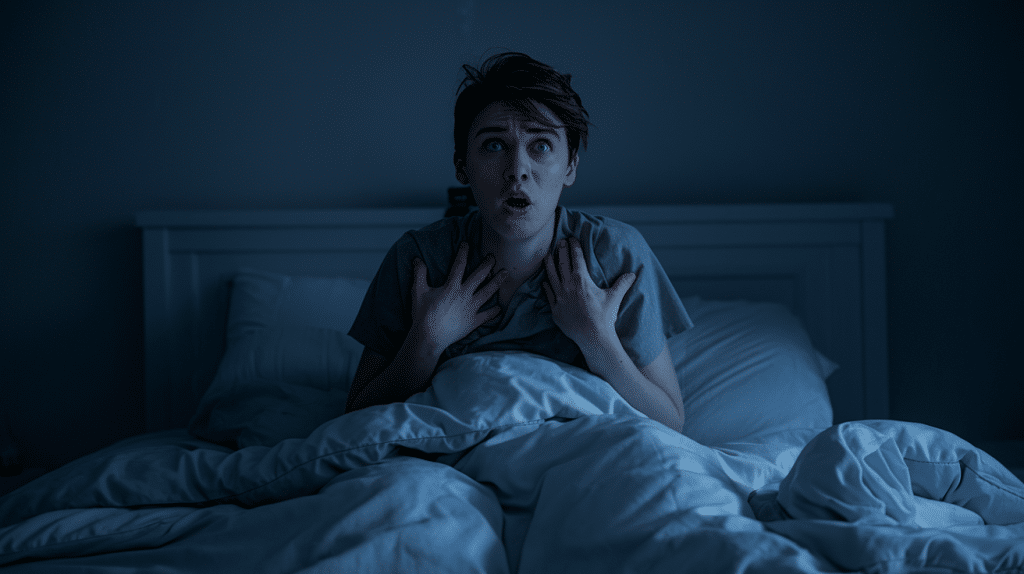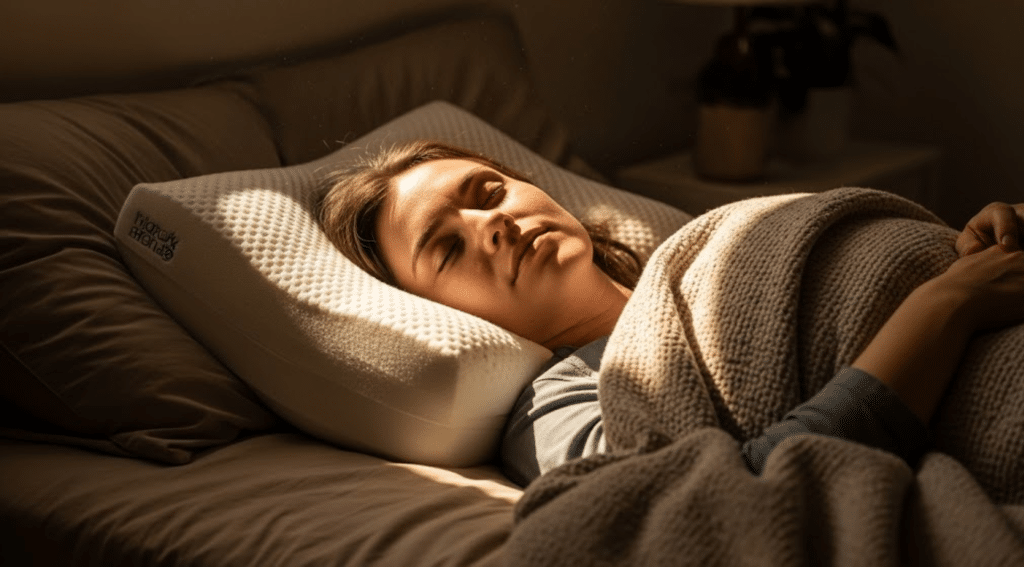Ever wake up with that stiff, aching neck and wonder how sleep managed to do that to you? I’ve been there, and I know how one bad night can throw off your whole day.
Neck pain from sleeping is surprisingly common, and it usually comes down to how you sleep and what you’re sleeping on.
Today, I’ll walk you through the main causes, like poor sleep positions and the wrong kind of pillow, and show you some easy, practical ways to fix it. You’ll also get tips on how to keep that pain from coming back.
If you’re tired of starting your day sore and stiff, let’s get to the bottom of it and figure out how you can wake up feeling good again.
Why Sleep Position Controls Your Sleep Experience
Your sleeping position dramatically affects your overall sleep quality in ways you might not realize. Poor positions can lead to frequent tossing and turning, disrupting your deep sleep cycles and leaving you feeling tired.
Neck pain from sleeping is just one of many issues that stem from poor sleeping posture. You might also experience back pain, trapezius pain after sleeping, reduced breathing efficiency, and even digestive problems, depending on how you sleep.
When your body isn’t properly aligned, you’re more likely to wake up multiple times during the night. This constant disruption prevents you from getting the restorative sleep your body needs to function well the next day.
What Causes Neck Pain from Sleeping?

I’ll explain the main reasons why you wake up with neck pain after what should be restful sleep. You need to understand these common culprits to fix your morning discomfort effectively.
1. Improper Sleeping Positions
Stomach sleeping is the worst position for your neck because it forces you to twist your head unnaturally. This puts serious strain on your neck muscles and spine alignment throughout the night.
Twisted or awkward positions also create uneven pressure on your joints. Side and back sleeping keep your neck in a neutral position, reducing strain and morning pain.
2. Incorrect Pillow Choice
Your pillow plays a huge role in supporting your neck’s natural curve while you sleep. Pillows that are too high push your neck forward, while too-low pillows offer no support at all.
Overly firm pillows create pressure points, and soft pillows let your head sink too deeply. The right pillow keeps your head level with your spine.
3. Underlying Conditions
Sleep apnea can make you toss and turn frequently, putting your neck in stressful positions. Muscle tension from conditions like fibromyalgia makes your neck more sensitive to any strain.
Arthritis in your neck joints creates stiffness that worsens during long periods of immobility. These conditions make even small sleeping mistakes much more painful.
4. Muscle Strain and Tension
Daily stress and poor posture create tight neck muscles that don’t relax during sleep. Hours spent hunched over computers or phones build up tension in your shoulders and neck.
This muscle tightness makes your neck more vulnerable to pain from even minor sleeping position mistakes. Stressed muscles need proper support to heal overnight.
Remedies for Neck Pain from Sleeping
When you wake up with neck pain, you need quick relief methods that actually work. Here are proven remedies that can ease your discomfort and get you moving again:
- Heat and Cold Therapy: Apply ice for the first 24 hours to reduce swelling, then switch to heat to relax tight muscles and improve blood flow
- Gentle Neck Stretches: Try slow side-to-side head turns, shoulder rolls, and chin tucks to release tension without straining your already sore muscles
- Massage Techniques: Use your fingers to gently rub sore spots, or roll a tennis ball against a wall to target trigger points in your neck and shoulders
- Over-the-Counter Medications: Take ibuprofen or acetaminophen as directed on the package, but don’t rely on pills as your only long-term solution for recurring pain
These remedies work best when you use them together rather than relying on just one method. Start with gentle approaches and see what gives you the most relief.
How to Prevent Neck Pain from Sleeping

You can prevent most sleeping neck pain by making smart choices about your pillow, position, mattress, and bedtime habits. These key steps will help you protect your neck and wake up pain-free every morning.
Learning how to sleep to avoid neck pain starts with the right pillow that keeps your head level with your spine, with memory foam working well for most people. Side and back sleeping positions maintain proper alignment, while stomach sleeping should be avoided completely.
Your mattress needs to support your body’s natural curves without sagging or creating pressure points. Good sleep hygiene also matters; keep your bedroom cool, dark, and quiet while sticking to a consistent bedtime schedule.
Replace pillows every two years and mattresses every seven to ten years for optimal neck support and pain prevention.
When to Seek Professional Help
You should see a doctor if your neck pain from sleeping lasts more than a few days or gets worse instead of better. Severe pain that shoots down your arms or causes numbness could signal serious problems like herniated discs or pinched nerves.
Don’t ignore persistent pain that interferes with your daily activities or keeps you awake at night. If you suspect sleep apnea or other sleep disorders are contributing to your neck issues, talk to your healthcare provider.
They can order sleep studies and recommend proper treatment options. Chiropractors and physical therapists specialize in structural problems that cause ongoing neck pain.
These professionals can identify underlying issues with your spine alignment and create personalized treatment plans to address the root cause of your sleeping neck pain.
Wrapping It Up
Now you’ve got a better idea of what causes neck pain from sleeping and how a few simple changes can really help. I’ve found that adjusting your sleep position, switching pillows, or just paying attention to your daily habits can make a big difference.
Take a minute to think about how you sleep. What’s one small tweak you could try tonight to feel better in the morning?
Maybe it’s avoiding stomach sleeping, picking a more supportive pillow, or doing a light stretch before bed. Whatever it is, even one change can move you in the right direction. Sleep should leave you feeling rested, not sore.
And trust me, staying consistent with your sleep setup and routine really pays off.
If you’re looking for more ways to sleep better and wake up feeling good, take a look at the other tips I’ve shared on the website. Your neck will thank you.











